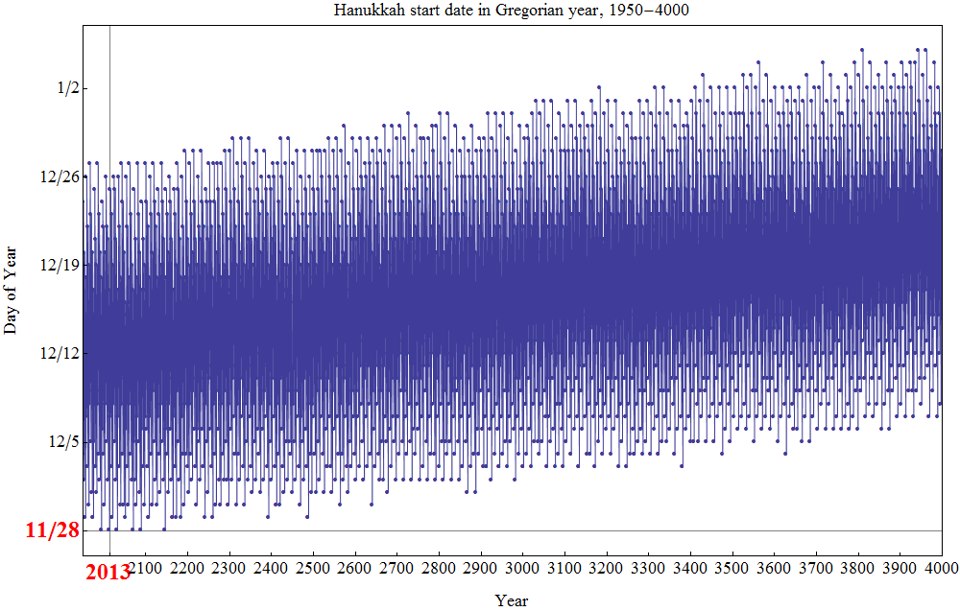Latkes and Turkey
For Americans, Thanksgiving Day is a time for families to gather and share a meal, traditionally one involving turkey. For Jews, Hanukkah is a time for families to gather and, similarly, share a meal, traditionally one involving fried potato pancakes known as latkes. (Here’s a recipe.) The two foods are very different — one is baked in the oven seemingly forever, and (when done right) comes out moist and tender. The other is fried in a pan, swimming in oil, and to taste, ends up crispy. Perhaps the two foods would go well together at the same meal?
Millions of American Jews will decide that question this year — and, most likely, never again afterward.
Thanksgiving, by federal statute, falls on the fourth Thursday of November. This means that the latest possible date for Thanksgiving to be on is November 28th. That happens every seven years. Hanukkah bounces around a lot more. The holiday begins on the 25th day of the Hebrew month of Kislev, which typically coincides with November, December, or January. But because of how the Hebrew calendar works, that bounces around a bit when translated to the Gregorian calendar most of the world — including Israel — uses. (Most.) The Hebrew calendar is on a lunar cycle and primarily used for religious purposes. A regular lunar year on the Hebrew calendar has about 353 days, with twelve months of either 29 or 30 days. But because the lunar calendar would fall out of sync with the solar calendar, there are seven leap years out of every 19. And each leap year adds a 30-day month to the calendar. So in theory, the first day of Hanukkah should fall on November 28th — the earliest possible date — every 19 years.
In practice, though, to ensure that the Hebrew calendar meets the proscribed religious requirements, some months occasionally have a day added to them. If you look at this table, you’ll see that some Hebrew years have 353 days, others have 354, and some have 355, while leap years can have 383, 384, or 385. (If you’re interested, this section on Wikipedia helps explain the whys and hows here.) So Hanukkah bounces around a bunch, and as one researcher figured out, the whole Hebrew calendar is slowly coming out of sync with the Gregorian one, at the rate of 4 days every 1,000 years. And what he realized, as graphed below, is that November 28th won’t be Hanukkah’s earliest start date for much longer. The holiday will slowly begin to start (even at its earliest) at a later date.

The two holidays should coincide once every 133 years — that’s 19 times 7 — but because of the slow slipping of the Hebrew calendar, it won’t happen again for another 70-something thousand years, when it slips so far backward that it effectively gets lapped. (Unless the powers-that-be revise the Hebrew calendar, that is, which is likely to happen at some point.) But because Jewish holidays begin on the evening before the first day, in 2070 and again in 2165, the first night of Hanukkah will fall on Thanksgiving Day. So if you don’t have the latkes ready for the turkey this year, you have fifty-seven years to get ready for the next pass.
Bonus fact: They don’t celebrate the American Thanksgiving in Israel, obviously, so that’s one of the two reasons why Israelis won’t be eating Thanksgiving turkey with their latkes on November 28th of this year. The other reason? It’s hard to find a commercially-made latke in Israel. According to the Jewish Chronicle, trade unionists in the 1920s discouraged commissaries from offering latkes, believing that a culture which adopted a typically homemade food would be bad for business. Instead, they suggested that the sale of harder-to-make jelly doughnuts (called sufganiyot) be encouraged. Nearly a century later, that tradition — and not the tradition of latkes — has taken hold in the tiny nation.
From the Archives: When Elephants and Donkeys Fought over Turkey: How Thanksgiving’s changing date changed.
Related: “The Latke Who Couldn’t Stop Screaming: A Christmas Story.” I think I need to buy this. Also, a six-pack of latke mix, in case you want to try some.
